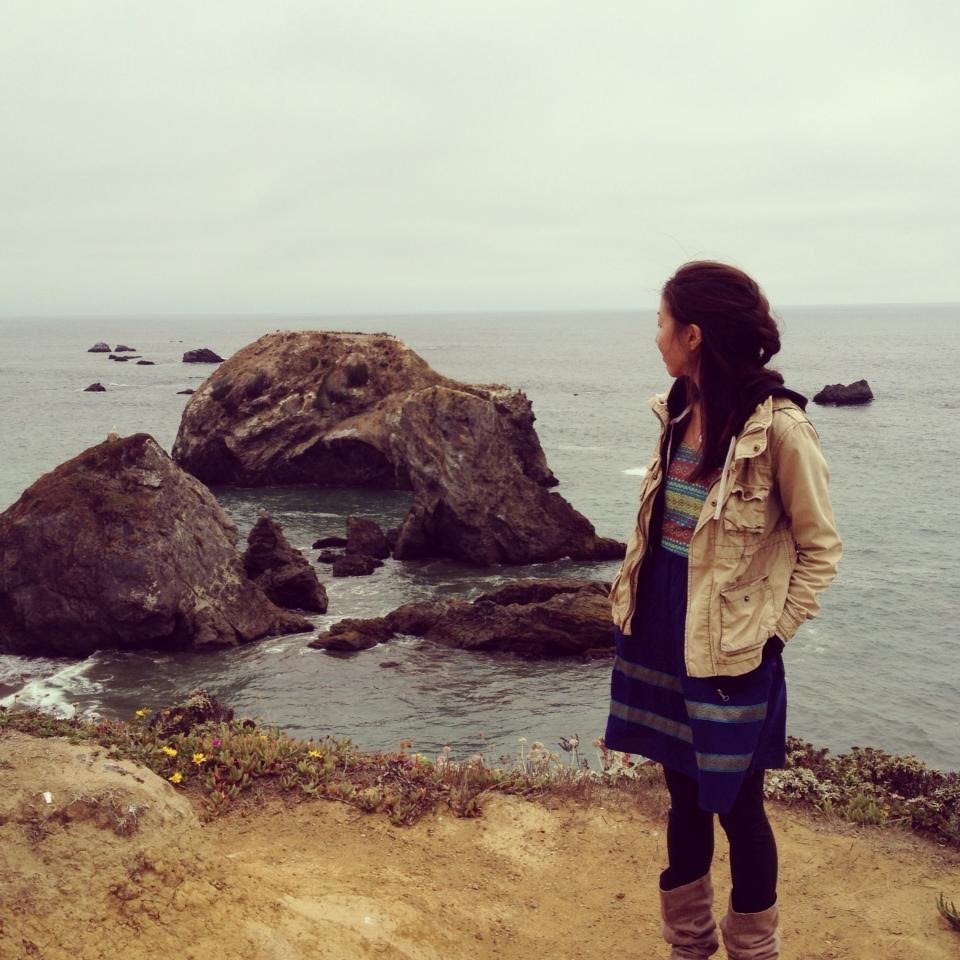42.2 Feature: Craft Essay by Jennifer S. Cheng

Jennifer S. Cheng holds an MFA in Nonfiction from the University of Iowa and an MFA in poetry from San Francisco State University. A poet and essayist, she is the author of Invocation: An Essay (New Michigan Press), and the recipient of fellowships from the U.S. Fulbright program and Kundiman. Her writing appears in Tin House, Tarpaulin Sky, AGNI, Web Conjunctions, Mid-American Review, and elsewhere. She lives in San Francisco, where she is the founding editor of Drop Leaf Press. Read more at jenniferscheng.com.
A Craft Essay for From the Voice of the Lady in the Moon
by Jennifer S. Cheng
Sometimes it helps to say it through a seashell. The sound of it washed in waves, loud yet silent, trailing in and out. Sometimes it wants to be said with a slowness that looms, an hour giving way to cloud and fog, the way it starts outside my window, twenty blocks to the shore, and drifts gradually toward me until my apartment, four floors up, is immersed in a pale envelope.
*
I wanted a way to say, Here is a woman watching her house come undone.
Or: Sometimes in order to build something, you must unbuild it first.
*
A myth is a narrative we are given as children. It comes to us whole and all surface. It says: A Lady is trapped on the moon because she is a bystander. It says: A Lady had no intentions of leaving the ground and floating toward the sky. It says: She will always be homeless, her body will never belong to her.
*
When we set about infusing a voice, where do we begin? Its shadow spaces, half-obscured corners, the ellipses at the tail of its third breath. The sound that cowers is usually the one that rings deepest. Is most true. To find the center, I turned toward the edges fraying in the dark. Perhaps I was looking for its broken parts. Perhaps I wanted to un-know a myth. We intuited the holes, we knew they were there, we only meant to locate them.
*
So: The parts of her voice that are cloudy, like a dark tea as it is beginning to steep. Her voice in the moment of expanding or contracting. Before or after or in the vapor of the actual events, which is to say, not the events themselves but their condensations. The humid pause between inhalation and exhalation. When nothing is happening but everything. The in-between that no one tells.
*
If it is true that every story has a shadow story. If there is always an underbelly to be found. If a woman’s voice is a space that begins boundaried in. If there was something I wanted to speak into the air, the clotted atmosphere, if I thought to myself, The edge of her dress, my fingers in her hair. If it was ruin, and I carried it heavy and spilling in my belly, a breadth too immense for my own. So I wanted to say it to the corner of the room. So I borrowed the shape of her mouth.
*
What texture, what temperature, what manner of weather might we find inscribed? Something with which to spread our body so it is no longer buried. We are always finding ourselves too large for the clothes on our backs, their knitted borders yet veiling us in, a protective outer layer. If I meant to shutter anything, it was only so I could see how thick and how deep the midnight tidewater goes.
*
I wanted to say: a new aesthetics of domesticity. I wanted to say: she.
*
If she is more than an outline of her form.
If she holds a wilderness that is beginning to unfold…
*
There is upheaval in small spaces. A world comes untethered in a pinprick. In a crack in the door jamb, in a dust pile under the bed. When the rain comes, sometimes I find I have always been waiting for it with my ear to the ground.
*
Her voice is the rhythm of sleepwalking. In sleep we are no better than animals. In sleep the moon is a magnet that regulates our breath. A body that sleepwalks sheds as much as it collects: pathways, murmurings, attempts of the appendages. It happens when the body is suspended in quiet chaos: night, sleep. Or a slice, slant-cut of a too-bright afternoon. Let us haunt the air with a small even-tempered earthquake. We are always reporting on the stirrings surrounding our bodies.
*
To dress in the intimacy of second-hand clothing: to wear something, like a sweater, that has been stretched by the warmth of another’s frame: to know that each loose patch, each gathered seam, flattened pouch, holds the ghostly imprint of another’s movements: a bodily knowledge: a layering of echoes: to take an object historically defined and set its boundaries in motion.
*
A story for a child shapes her home. Hems her in. Folk tales, fairy stories. She has known it since she was young. She has waited for its edges to become unravelled, she has watched to see herself woven in. To restructure the world, one must first unstructure it. To claim a tale, one must name it. Language is something we unguard and guard, so that bewilderment and shelter can come together and all at once.
*
Never mind a simple story, I wanted contradiction. A full-bodied shape brimming with silence and thunder, chaos and wholeness, boldness and disorientation. Things disintegrating even as they take on mass. We are, if anything, in tension.